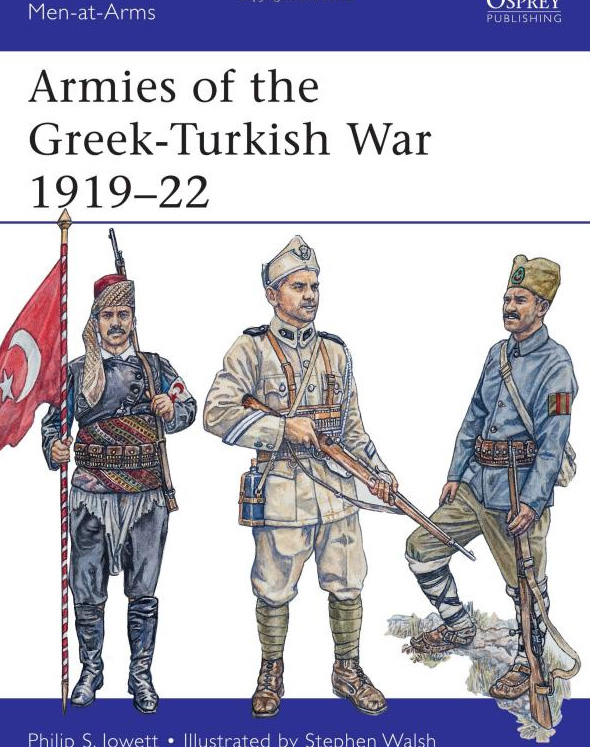Armies of the Greek-Turkish War 1919-22
Review

Armies of the Greek-Turkish War 1919-22, Philip S Jowett, Osprey Publishing, 2015, £9.95, 48 pages, ISBN 978-1-4728-0684-0
In his introduction to the Oxford Illustrated History of the First World War (2014 edition) Sir Hew Strachan noted that warfare didn't end neatly because an armistice was agreed with Germany on 11 November 1918. ‘Conflict persisted across central and eastern Europe; civil wars divided Russia and Poland; Turkey fought to reshape itself and its frontiers after its defeat; and the revolutions held in check on the peripheries of the European empires between 1914 and 1918 erupted immediately thereafter.' This excellent
booklet in the Osprey Men-at-Arms series tells the story of one of these conflicts, the Greek-Turkish War of 1919 to 1922, that would be described by the Greeks as the ‘Great Catastrophe' and was to lead to the establishment of the modern Turkish state.
The illustrations by Stephen Walsh are, as ever, of the highest quality but the outstanding feature is the sheer amount of information on this complicated conflict that Philip Jowett has been
able to include, whilst remaining eminently readable. He recounts the support, moral and practical, that the Entente/Allied nations gave to Greece for its invasion of Anatolia and the parlous state of Turkish resistance.
Once Allied support was reduced in 1921, because of the return of King Constantine to the Greek throne, it was only a matter of time before the Turkish Nationalists triumphed under the leadership of Gallipoli hero Mustapha Kemal.
Jowett has made clearer to me part of my own regiment's story, as 1st Battalion the North Staffords was sent to Thrace in September 1922 to help oversee the armistice and then the peace treaty; the regimental history includes a little-known photograph of its soldiers marching into Constantinople (later Istanbul). That history also includes details of the massive movement of populations that followed the armistice, something that had been a feature of the breakup of the Ottoman Empire since 1911, including the
Armenian Genocide. Jowett doesn't ignore the widespread atrocities against civilians on both sides during this Greek-Turkish War but space doesn't allow him to dwell on them.
Osprey has a published a number of booklets on the final years of the Ottoman Empire in the Men-at-Arms series: Armies of the Balkan Wars 1912-13, also by Philip Jowett; and The Ottoman Army 1914-18 and Ottoman Infantrymen 1914-18 both by David Nicolle. They have also produced a
64-page booklet on Mustafa Kemal Atatürk by Edward J Erikson, the American historian who has done so much to open up Ottoman archives of the period.

